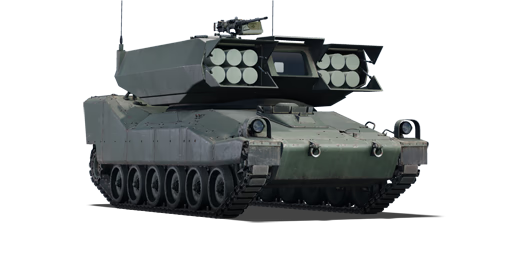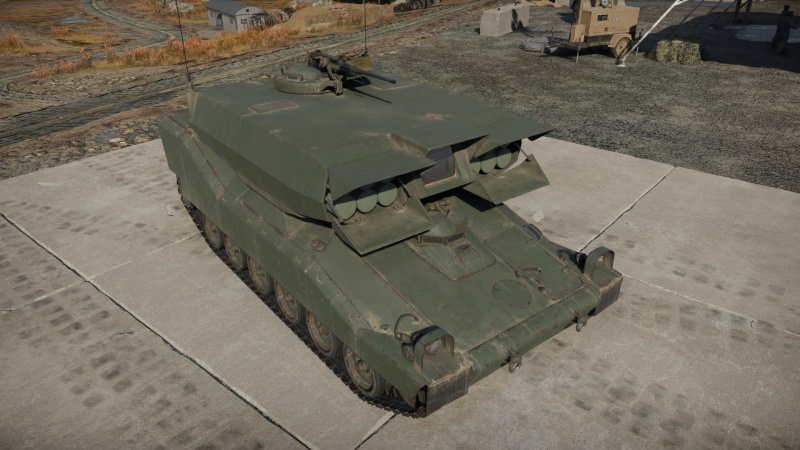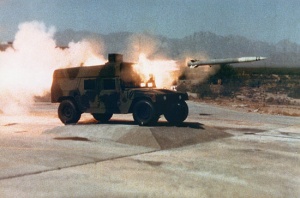Difference between revisions of "LOSAT"
(Armor information) (Tag: Visual edit) |
m (Spacing) (Tag: Visual edit) |
||
| Line 24: | Line 24: | ||
|- | |- | ||
| Hull || 38.1 mm (76-59°) ''Front glacis'' | | Hull || 38.1 mm (76-59°) ''Front glacis'' | ||
| − | 38.1 mm (17°) ''Front plate'' 25.4 mm (77°) ''Lower glacis'' | + | 38.1 mm (17°) ''Front plate'' |
| + | |||
| + | 25.4 mm (77°) ''Lower glacis'' | ||
12.7 mm (8-87°) ''Driver's port'' | 12.7 mm (8-87°) ''Driver's port'' | ||
Revision as of 15:46, 16 June 2024
Contents
Description
The LOSAT-CCVL is a gift rank VII American tank destroyer with a battle rating of 10.0 (AB/RB/SB). It was introduced during Update "Sons of Attila" as a reward for the 2023 Tokushu Heiki event.
General info
Survivability and armour
The most well protected side of the tank is the front, even though it has not much armour since it is based on the CCVL chassis. The biggest weak spot on the tank is the huge turret on top of the chassis holding all the ammunition for the vehicle. Any tank that fires at the turret with its main armament will most certainly completely destroy the LOSAT.
Armour type:
| Armour | Front (Slope angle) | Sides | Rear | Roof |
|---|---|---|---|---|
| Hull | 38.1 mm (76-59°) Front glacis
38.1 mm (17°) Front plate 25.4 mm (77°) Lower glacis 12.7 mm (8-87°) Driver's port |
25.4 mm (36-90°) Top 44 mm Bottom |
25.4 mm (14-15°) ( (0-57°) Next to tracks )
12.7 mm (0-37°) Rear block |
25.4 mm (90°)
10 mm (90°) Engine ventilation grilles |
| Turret | 25.4 mm (0-90°) Turret front 12 mm Window |
25.4 mm (18°)
12.7 mm (45°) Turret ring |
25.4 mm (0-21°) | 25.4 mm |
| Cupola | 25.4 mm (Cylindrical) | 25.4 mm (Cylindrical) | 25.4 mm (Cylindrical) | 25.4 mm (Cylindrical) |
Notes:
Mobility
Write about the mobility of the ground vehicle. Estimate the specific power and manoeuvrability, as well as the maximum speed forwards and backwards.
| Game Mode | Max Speed (km/h) | Weight (tons) | Engine power (horsepower) | Power-to-weight ratio (hp/ton) | |||
|---|---|---|---|---|---|---|---|
| Forward | Reverse | Stock | Upgraded | Stock | Upgraded | ||
| Arcade | 75 | 16 | 19.5 | 817 | 1,097 | 41.9 | 56.26 |
| Realistic | 69 | 15 | 509 | 575 | 26.1 | 29.49 | |
Modifications and economy
Armaments
Main armament
| LOSAT/MGM-166 missile | Turret rotation speed (°/s) | Reloading rate (seconds) | |||||||||||
|---|---|---|---|---|---|---|---|---|---|---|---|---|---|
| Mode | Capacity (Belt) | Vertical | Horizontal | Stabilizer | Stock | Upgraded | Full | Expert | Aced | Stock | Full | Expert | Aced |
| Arcade | 12 (12) | - | ±110° | - | 26.4 | 36.5 | 44.4 | 49.1 | 52.2 | 19.50 | 17.25 | 15.90 | 15.00 |
| Realistic | 17.9 | 21.0 | 25.5 | 28.2 | 30.0 | ||||||||
Ammunition
| Penetration statistics | |||||||
|---|---|---|---|---|---|---|---|
| Ammunition | Type of warhead |
Penetration @ 0° Angle of Attack (mm) | |||||
| 10 m | 100 m | 500 m | 1,000 m | 1,500 m | 2,000 m | ||
| MGM-166 | ATGM | 70 | 150 | 443 | 775 | 729 | - |
| Missile details | ||||||||||||
|---|---|---|---|---|---|---|---|---|---|---|---|---|
| Ammunition | Type of warhead |
Velocity (m/s) |
Range (m) |
Projectile mass (kg) |
Fuse delay | Fuse sensitivity (mm) |
Explosive mass (TNT equivalent) (g) |
Ricochet | ||||
| 0% | 50% | 100% | ||||||||||
| MGM-166 | ATGM | 1,520 | 5,000 | 78.92 | - | - | - | 78° | 80° | 81° | ||
Ammo racks
| Full ammo |
1st rack empty |
2nd rack empty |
3rd rack empty |
4th rack empty |
5th rack empty |
6th rack empty |
Visual discrepancy |
|---|---|---|---|---|---|---|---|
| 1 | __ (+__) | __ (+__) | __ (+__) | __ (+__) | __ (+__) | __ (+__) | __ |
Machine guns
| 12.7 mm M2HB | ||||
|---|---|---|---|---|
| Mount | Capacity (Belt) | Fire rate | Vertical | Horizontal |
| Pintle | 1,000 (200) | 575 | -5°/+10° | ±70° |
Usage in battles
The LOSAT is a very quick and agile vehicle. Although it boasts very little armour, its armament is exceptional. The MGM-166 is small propelled dart which does more damage the further it travels. The LOSAT has a very simple playstyle: use it in long range engagements, roughly at 1,500 or more metres. This will allow the ammunition to speed up to its full potential dealing extreme amounts of penetration as much as 729 mm on a standard vehicle regardless of the angle and direction. It is recommended to snipe with the vehicle across maps. Simply position somewhere and let loose with your supersonic weapons.
Pros and cons
Pros:
- MGM-166s are kinetic penetrators and not reliant on HEAT charges, which can make it avoid most ATGM ERAs
- Extremely high penetration values at farther ranges
- 12 missiles are highly effective and enough to deal with targets
- Missiles can be too fast for IRCM systems to react
Cons:
- No vertical guidance at all
- The MGM-166s instability can cause inaccuracy when hitting targets, especially when firing from angled surfaces
- Being in close-medium combat can be too short to effectively generate enough velocity to penetrate armour
- Missile drop when firing can cause impact into terrain/objects
- Extremely long ammo replenish length (over a minute in Realistic battles, around 30 seconds in Arcade battles)
History
The LOSAT (Line-of-Sight Anti-Tank) system was an evolution of a prior multi-platformed guided missile system design. The concept was initially born out of a US Army requirement for a missile with the capabilities to destroy all types of tanks and armoured vehicles found to be outside of conventional gun range. While other missiles currently in service such as the Tube-launched, Optically tracked, Wire-guided (TOW) system were capable of meeting the range requirements, the Army was concerned that these missiles were ineffective due to slow speeds and long flight times to their target at long range. The missile itself was designed by the "Vought" Aerospace company, while Texas Instruments partnered with the firm by providing their upgraded FLIR system. The initial plan for the system was to mount it to the M2 Bradley, and later the M8 Armored Gun chassis. However, due to cost concerns, it would eventually be mounted onto HUMVEEs with additional missiles carried by trailer.
The missile's specifications and design made it very different to most ATGM systems of its time. Rather than a dual-warhead, shaped-charge, or HEAT design, it relied on kinetic energy at very high speeds to penetrate the armour of any target it encountered. The design was first test-fired at the White Sands Missile Range in 1990, and orders for the missiles in small numbers were placed after the Army renewed the production contract. Despite this, production did not really begin in any notable numbers until the late 1990s, and only a dozen vehicles paired with 150 missiles were ordered. However, the DOD reduced the program to "Demonstration" status in 1996 and recommended that the program be killed entirely. It was instead re-instated under Lockheed Martin, and the order of missiles and vehicles began to slowly be delivered in 2002, shortly after a second order for 100 more missiles was placed. By this time, it had been nearly 15 years after the initial proposal by Vought. The missiles continued to be test-fired (this time at Fort Bliss) in 2004 before it became obvious to all involved that the project was simply going to be terminated for good. As time had gone on, the Army changed its requirements for the same type of system, preferring to employ a more compact, and lighter missile known as the Compact Kinetic Missile System that had already entered development and could achieve the same results.
Media
- Skins
- Videos
See also
Links to the articles on the War Thunder Wiki that you think will be useful for the reader, for example:
- reference to the series of the vehicles;
- links to approximate analogues of other nations and research trees.
External links
- Lockheed Martin MGM-166 LOSAT/KEM. (n.d.). http://www.designation-systems.net/dusrm/m-166.html
- Wikipedia contributors. (2022, November 5). MGM-166 LOSAT. Wikipedia. https://en.wikipedia.org/wiki/MGM-166_LOSAT
| USA tank destroyers | |
|---|---|
| M10 | M10 GMC |
| M36 | M36 GMC · M36B2 |
| T95 | T28 · T95 |
| M109 | M109A1 |
| ATGM | LOSAT · M901 |
| Wheeled | M3 GMC · T55E1 |
| Other | M8 HMC · M50 · M56 |
| China | ▃LVT(A)(4) (ZIS-2) |






